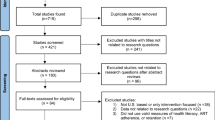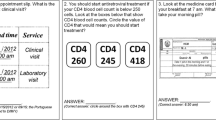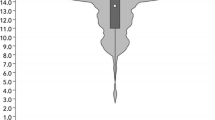Abstract
Findings on the relationship between health literacy and outcomes in HIV have been inconsistent. Health literacy has previously been operationalized as general functional literacy, but has not included content knowledge about HIV disease and treatment. Semi-structured interviews with people living with HIV in 2 U.S. cities, including questions about the etiology, pathophysiology and treatment of HIV. We compared responses to biomedical conceptions. The 32 respondents were demographically diverse. Although most understood that HIV degrades the immune system, none could explain the nature of a virus, or the mechanism of antiretroviral (ARV) drug action. Fewer than half accurately reported that it is desirable to have a high CD4+ cell count and low viral load. A minority understood the concept of drug resistance. While most believed that strict adherence to ARV regimens was important to maintain health, three believed that periodic treatment interruption was beneficial, and three believed they should not take ARVs when they used alcohol or illicit drugs. Respondents generally had very limited, and often inaccurate biomedical understanding of HIV disease. Most reported good regimen adherence but did not have any mechanistic rationale for it. The failure to find a consistent relationship between health literacy and ARV adherence may be largely because most people simply follow their doctors’ instructions, without the need for deep understanding.
Similar content being viewed by others
References
Horowitz HW, Telzak EE, Sepkowitz KA, Wormser GP. Human immunodeficiency virus infection, Part I. Dis Mon. 1998;44(10):545–606.
Hogg RS, Heath KV, Yip B, Craib KJ, O’Shaughnessy MV, Schechter MT, et al. Improved survival among HIV-infected individuals following initiation of antiretroviral therapy. JAMA. 1998;279(6):450–4.
Piacenti FJ. An update and review of antiretroviral therapy. Pharmacotherapy. 2006;26(8):1111–33.
Kitahata MM, Gange SJ, Abraham AG, Merriman B, Saag MS, Justice AC, et al. Effect of early versus deferred antiretroviral therapy for HIV on survival. N Engl J Med. 2009;360(18):1815–26.
Centers for Disease Control and Prevention. National HIV Prevention Progress Report, 2013. 2014.
Bangsberg DR, Perry S, Charlebois ED, Clark RA, Roberston M, Zolopa AR, et al. Non-adherence to highly active antiretroviral therapy predicts progression to AIDS. AIDS. 2001;15(9):1181–3.
Bangsberg DR, Kroetz DL, Deeks SG. Adherence-resistance relationships to combination HIV antiretroviral therapy. CurrHIV/AIDS Rep. 2007;4(2):65–72.
Paterson DL, Swindells S, Mohr J, Brester M, Vergis EN, Squier C, et al. Adherence to protease inhibitor therapy and outcomes in patients with HIV infection. Ann Intern Med. 2000;133(1):21–30.
Genberg BL, Wilson IB, Bangsberg DR, Arnsten J, Goggin K, Remien RH, et al. Patterns of antiretroviral therapy adherence and impact on HIV RNA among patients in North America. AIDS. 2012;26(11):1415–23.
Ledergerber B, Egger M, Opravil M, Telenti A, Hirschel B, Battegay M, et al. Clinical progression and virological failure on highly active antiretroviral therapy in HIV-1 patients: a prospective cohort study. Swiss HIV Cohort Study. Lancet. 1999;353(9156):863–8.
Sterne JA, Hernan MA, Ledergerber B, Tilling K, Weber R, Sendi P, et al. Long-term effectiveness of potent antiretroviral therapy in preventing AIDS and death: a prospective cohort study. Lancet. 2005;366(9483):378–84.
Cohen MS, Chen YQ, McCauley M, Gamble T, Hosseinipour MC, Kumarasamy N, et al. Prevention of HIV-1 infection with early antiretroviral therapy. N Engl J Med. 2011;365(6):493–505.
National Research Council. In: Nielsen-Bohlman L, Panzer AM, Kindig DA, editors. Health Literacy: A Prescription to End Confusion. Washington: The National Academies Press; 2004.
Gazmararian JA, Kripalani S, Miller MJ, Echt KV, Ren J, Rask K. Factors associated with medication refill adherence in cardiovascular-related diseases: a focus on health literacy. J Gen Intern Med. 2006;21(12):1215–21.
Muir KW, Santiago-Turla C, Stinnett SS, Herndon LW, Allingham RR, Challa P, et al. Health literacy and adherence to glaucoma therapy. Am J Ophthalmol. 2006;142(2):223–6.
Schillinger D, Grumbach K, Piette J, Wang F, Osmond D, Daher C, et al. Association of health literacy with diabetes outcomes. JAMA. 2002;288(4):475–82.
Bohanny W, Wu SF, Liu CY, Yeh SH, Tsay SL, Wang TJ. Health literacy, self-efficacy, and self-care behaviors in patients with type 2 diabetes mellitus. J Am Assoc Nurse Pract. 2013;25(9):495–502.
Williams MV, Baker DW, Parker RM, Nurss JR. Relationship of functional health literacy to patients’ knowledge of their chronic disease. A study of patients with hypertension and diabetes. Arch Intern Med. 1998;158(2):166–72.
Dewalt DA, Berkman ND, Sheridan S, Lohr KN, Pignone MP. Literacy and health outcomes: a systematic review of the literature. J Gen Intern Med. 2004;19(12):1228–39.
Davis TC, Long SW, Jackson RH, Mayeaux EJ, George RB, Murphy PW, et al. Rapid estimate of adult literacy in medicine: a shortened screening instrument. Fam Med. 1993;25(6):391–5.
Nokes KM, Coleman CL, Cashen M, Dole P, Sefcik E, Hamilton MJ, et al. Health literacy and health outcomes in HIV seropositive persons. Res Nurs Health. 2007;30(6):620–7.
Paasche-Orlow MK, Cheng DM, Palepu A, Meli S, Faber V, Samet JH. Health literacy, antiretroviral adherence, and HIV-RNA suppression: a longitudinal perspective. J Gen Intern Med. 2006;21(8):835–40.
Wolf MS, Davis TC, Osborn CY, Skripkauskas S, Bennett CL, Makoul G. Literacy, self-efficacy, and HIV medication adherence. Patient Educ Couns. 2007;65(2):253–60.
Osborn CY, Paasche-Orlow MK, Davis TC, Wolf MS. Health literacy: an overlooked factor in understanding HIV health disparities. Am J Prev Med. 2007;33(5):374–8.
Parker RM, Baker DW, Williams MV, Nurss JR. The test of functional health literacy in adults: a new instrument for measuring patients’ literacy skills. J Gen Intern Med. 1995;10(10):537–41.
Kalichman SC, Ramachandran B, Catz S. Adherence to combination antiretroviral therapies in HIV patients of low health literacy. J Gen Intern Med. 1999;14:267–73.
Kalichman SC, Pope H, White D, Cherry C, Amaral CM, Swetzes C, et al. Association between health literacy and HIV treatment adherence: further evidence from objectively measured medication adherence. J Int Assoc Physicians AIDS Care (Chic). 2008;7(6):317–23.
Golin CE, Liu H, Hays RD, Miller LG, Beck CK, Ickovics J, et al. A prospective study of predictors of adherence to combination antiretroviral medication. J Gen Intern Med. 2002;17(10):756–65.
Paasche-Orlow MK, Wolf MS. The causal pathways linking health literacy to health outcomes. Am J Health Behav. 2007;31(Suppl 1):S19–26.
Caplan AL, McCartney JJ, Sisti DA. Health, Disease and Illness: Concepts in Medicine. Washington: Georgetown University Press; 2004.
Kleinman A, Eisenberg L, Good B. Culture, illness, and care: clinical lessons from anthropologic and cross-cultural research. Ann Intern Med. 1978;88(2):251–8.
Kleinman A. Patients and healers in the context of culture. An explorationof the borderland between anthropology, medicine, and psychiatry. Berkeley: University of California Press; 1981.
Laws MB, Wilson IB, Bowser DM, Kerr SE. Taking antiretroviral therapy for HIV infection: learning from patients’ stories. J Gen Intern Med. 2000;15(12):848–58.
Laws MB, Rose GS, Bezreh T, Beach MC, Taubin T, Kogelman L, et al. Treatment acceptance and adherence in HIV disease: patient identity and the perceived impact of physician-patient communication. Patient Prefer Adherence. 2012;6:893–903.
Mishler EG. The Discourse of Medicine: Dialectics of Medical Interviews. Norwood: Ablex; 1984.
Habermas J. The theory of communicative action. V.1. Reason and the rationalization of society. V.2. Lifeworld and system: a critique of functionalist reason. Boston: Beacon Press; 1984.
Mandell GL, Bennett JE, Dolin R. Mandell, Douglas, and Bennett’s Principles and Practice of Infectious Diseases, vol. 7. Philadelphia: Churchill Livingstone; 2010.
Kalichman SC, Amaral CM, White D, Swetsze C, Kalichman MO, Cherry C, et al. Alcohol and adherence to antiretroviral medications: interactive toxicity beliefs among people living with HIV. J Assoc Nurses AIDS Care. 2012;23(6):511–20.
Kalichman SC, Amaral CM, White D, Swetsze C, Pope H, Kalichman MO, et al. Prevalence and clinical implications of interactive toxicity beliefs regarding mixing alcohol and antiretroviral therapies among people living with HIV/AIDS. AIDS Patient Care STDS. 2009;23(6):449–54.
Kalichman SC, Grebler T, Amaral CM, McNerey M, White D, Kalichman MO, et al. Intentional non-adherence to medications among HIV positive alcohol drinkers: prospective study of interactive toxicity beliefs. J Gen Intern Med. 2013;28(3):399–405.
Acknowledgments
This research was supported by the National Institute of Mental Health, 1R21MH092781-01. Thanks to Tanya Bezreh for interviewing.
Author information
Authors and Affiliations
Corresponding author
Rights and permissions
About this article
Cite this article
Laws, M.B., Danielewicz, M., Rana, A. et al. Health Literacy in HIV Treatment: Accurate Understanding of Key Biological Treatment Principles is Not Required for Good ART Adherence. AIDS Behav 19, 635–644 (2015). https://doi.org/10.1007/s10461-014-0931-8
Published:
Issue Date:
DOI: https://doi.org/10.1007/s10461-014-0931-8




